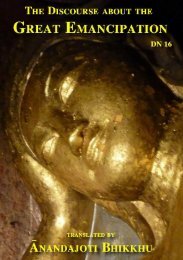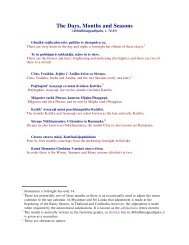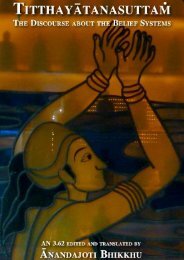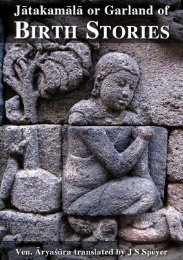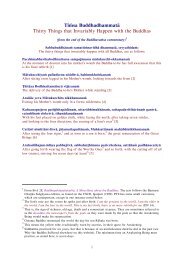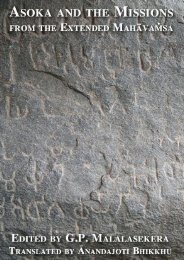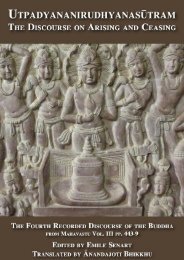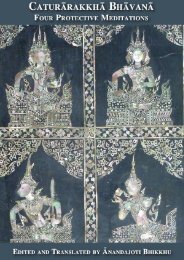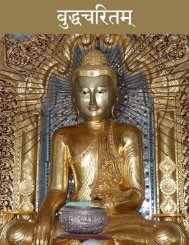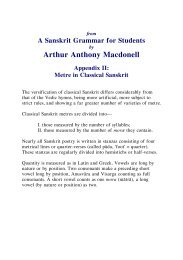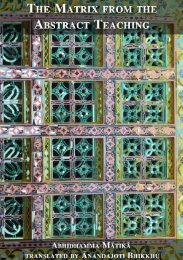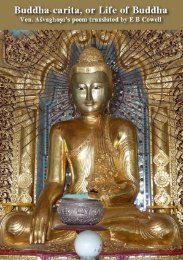BhikkhunÄ«saá¹yutta Thematic Discourses about Nuns - Ancient ...
BhikkhunÄ«saá¹yutta Thematic Discourses about Nuns - Ancient ...
BhikkhunÄ«saá¹yutta Thematic Discourses about Nuns - Ancient ...
Create successful ePaper yourself
Turn your PDF publications into a flip-book with our unique Google optimized e-Paper software.
SN 5. Bhikkhunīsaṁyuttaṁ<br />
The <strong>Thematic</strong> <strong>Discourses</strong> <strong>about</strong> <strong>Nuns</strong><br />
edited and translated by<br />
Ānandajoti Bhikkhu<br />
(September, 2011 / 2555)
2<br />
Table of Contents<br />
Texts<br />
Preface<br />
SN 5.1 Āḷavikāsuttaṁ<br />
SN 5.2 Somāsuttaṁ<br />
SN 5.3 Kisāgotamīsuttaṁ<br />
SN 5.4 Vijayāsuttaṁ<br />
SN 5.5 Uppalavaṇṇāsuttaṁ<br />
SN 5.6 Cālāsuttaṁ<br />
SN 5.7 Upacālāsuttaṁ<br />
SN 5.8 Sīsupacālāsuttaṁ<br />
SN 5.9 Selāsuttaṁ<br />
SN 5.10 Vajirāsuttaṁ
3<br />
Texts<br />
BJT: Sri Lankan edition, from the Buddha Jayanti Tripitaka Series, Volume XIII<br />
(Colombo, 1976/2519, reprinted with corrections 2005).<br />
Thai: Thai edition, as found on Budsir for Windows CD-ROM (version 2.0, Bangkok,<br />
1996).<br />
ChS: Burmese edition, as found on the Chaṭṭha Saṅgāyana CD-ROM (version 3,<br />
Igatpuri, no date, but = 1999).<br />
PTS: European edition, The Sagāthavagga, ed. G. A. Somaratne, (Oxford, 1998).<br />
Comm: Sagāthāvagga-aṭṭhakathā, as found on the Chaṭṭha Saṅgāyana CD-ROM<br />
(version 3, Igatpuri, no date, but = 1999).
4<br />
Preface<br />
In preparing this text and translation for publication I have divided it into a number<br />
of versions. In the Buddhist Texts and Studies section will be found the Pāḷi Text<br />
together with the variant readings. This is a more technical work dealing with the<br />
establishment of the text.<br />
In the Texts and Translations section I present the full Text and Translation with<br />
annotations which help to explain matters that may not be clear from the text itself. I<br />
have therefore translated the Commentary, such as it is, in its entirety, which will at<br />
least give students some idea of what a Commentary is like.<br />
In the English section there is the Translation Only, with somewhat less notes than in<br />
the Text and Translations section, which is intended for the casual reader who wants<br />
a reliable translation but is not interested in the technical matters concerning the<br />
original text itself.<br />
I have also recorded both the English translation and the Pāḷi text, which are<br />
available on their respective pages; and can also be accessed separately on the Audio<br />
page.<br />
The establishment of the text involved no great difficulties, and the variations are<br />
minor for the most part. Wherever necessary I have indicated why I preferred a<br />
reading, or what the relationship of the alternative reading is to the text, although<br />
there is sometimes extra information in this regard in the Text and Translation<br />
version.<br />
I have filled in the ellipses found in the original as I believe they would have been<br />
done by the recitor (bhāṇaka) during recital. Where ellipsis should be marked is very<br />
fluid between the different editions, which perhaps indicates that it was a matter for<br />
the scribe to decide, rather than a strict textual tradition.<br />
Ānandajoti Bhikkhu<br />
September 2011
5<br />
SN 5. Bhikkhunīsaṁyuttaṁ<br />
The <strong>Thematic</strong> <strong>Discourses</strong> <strong>about</strong> <strong>Nuns</strong><br />
SN 5.1 Āḷavikāsuttaṁ<br />
The Discourse <strong>about</strong> Āḷavikā<br />
162. Evaṁ me sutaṁ:<br />
Thus I have heard:<br />
ekaṁ samayaṁ Bhagavā Sāvatthiyaṁ viharati<br />
at one time the Gracious One was dwelling near Sāvatthī<br />
Jetavane Anāthapiṇḍikassa ārāme.<br />
at Anāthapiṇḍika’s grounds in Jeta’s Wood.<br />
Atha kho Āḷavikā bhikkhunī, pubbaṇhasamayaṁ nivāsetvā,<br />
Then the nun Āḷavikā, 1 having dressed in the morning time,<br />
pattacīvaram-ādāya, Sāvatthiṁ piṇḍāya pāvisi.<br />
after picking up her bowl and robe, was entering Sāvatthī for alms.<br />
Sāvatthiyaṁ piṇḍāya caritvā, pacchābhattaṁ piṇḍapātapaṭikkantā,<br />
After walking for alms in Sāvatthī, and returning from the alms-round after the<br />
meal,<br />
yena Andhavanaṁ tenupasaṅkami vivekatthinī.<br />
she approached the Blind Man’s Wood 2 seeking for seclusion.<br />
Atha kho Māro pāpimā<br />
Then the Wicked Māra<br />
1 Comm: Āḷavikā ti Āḷaviyaṁ jātā Āḷavinagarato yeva ca nikkhamma pabbajitā; Āḷavikā means<br />
she was born in Āḷavī and she went forth from the town of Āḷavī.<br />
2 Comm: Andhavanan-ti Kassapasammāsambuddhassa cetiye navakammatthāya dhanaṁ<br />
samādapetvā, āgacchantassa Yasodharassa nāma Dhammabhāṇakassa ariyapuggalassa<br />
akkhīni uppāṭetvā, tattheva akkhibhedappattehi pañcahi corasatehi, nivutthattā tato paṭṭhāya<br />
Andhavanan-ti saṅkhaṁ gataṁ vanaṁ. Taṁ kira Sāvatthito dakkhiṇapasse gāvutamatte hoti<br />
Rājārakkhāya guttaṁ, tattha pavivekakāmā bhikkhū ca bhikkhuniyo ca gacchanti. Tasmā<br />
ayam-pi kāyavivekatthinī yena taṁ vanaṁ tenupasaṅkami. Blind Man's Wood, having taken<br />
riches for the purpose of the work on the Chetiya of the Fully Awakened Kassapa, after they<br />
tore out the eyes of the Dhamma recitor named Yasodhara, who was a Noble One, five<br />
hundred thieves lost their own sight and dwelt right there because of it, and the name Blind<br />
Man's Wood came to that wood. It seems it was around a half a league on the southern side<br />
of Sāvatthī and was guarded and protected by the King, and monks and nuns who desired<br />
seclusion would go there. Therefore seeking for bodily seclusion she approached that wood.
The <strong>Thematic</strong> <strong>Discourses</strong> <strong>about</strong> <strong>Nuns</strong> - 6<br />
Āḷavikāya bhikkhuniyā bhayaṁ chambhitattaṁ lomahaṁsaṁ uppādetukāmo,<br />
desiring to give rise to fear, terror, and horror in the nun Āḷavikā,<br />
vivekamhā cāvetukāmo, yena Āḷavikā bhikkhunī tenupasaṅkami,<br />
desiring to drive her out of seclusion, approached the nun Āḷavikā,<br />
upasaṅkamitvā Āḷavikaṁ bhikkhuniṁ gāthāya ajjhabhāsi:<br />
and after approaching he addressed the nun Āḷavikā with a verse:<br />
“Natthi nissaraṇaṁ loke, kiṁ vivekena kāhasi?<br />
“There is no escape 3 from the world, why do you try with seclusion?<br />
Bhuñjassu kāmaratiyo, māhu pacchānutāpinī.” ti<br />
Enjoy the sensual delights, do not be remorseful hereafter.”<br />
Atha kho Āḷavikāya bhikkhuniyā etad-ahosi:<br />
Then it occurred to the nun Āḷavikā:<br />
“Ko nu khvāyaṁ manusso vā amanusso vā gāthaṁ bhāsatī?” ti<br />
“Who is this, a human or a non-human, speaking this verse?”<br />
Atha kho Āḷavikāya bhikkhuniyā etad-ahosi:<br />
Then it occurred to the nun Āḷavikā:<br />
“Māro kho ayaṁ Pāpimā<br />
“This is the Wicked Māra<br />
mama bhayaṁ chambhitattaṁ lomahaṁsaṁ uppādetukāmo,<br />
desiring to give rise to fear, terror, and horror in me,<br />
vivekamhā cāvetukāmo gāthaṁ bhāsatī.” ti<br />
desiring to drive me out of seclusion, who speaks this verse.”<br />
Atha kho Āḷavikā bhikkhunī: Māro ayaṁ Pāpimā iti viditvā,<br />
Then the nun Āḷavikā having understood: This is the Wicked Māra,<br />
Māraṁ Pāpimantaṁ gāthāhi paccabhāsi:<br />
replied with this verse to the Wicked Māra:<br />
“Atthi nissaraṇaṁ loke, paññāya me suphussitaṁ,<br />
“There is an escape from the world, which I have attained through wisdom, 4<br />
Pamattabandhu Pāpima, na tvaṁ jānāsi taṁ padaṁ,<br />
You do not know that state, 5 you Wicked one, kin of the heedless,<br />
3 Comm: nissaraṇan-ti nibbānaṁ, escape means Emancipation.<br />
4 Comm: paññāyā ti paccavekkhaṇañāṇena; through wisdom means through reflection<br />
knowledge (reflection on her attainment).
The <strong>Thematic</strong> <strong>Discourses</strong> <strong>about</strong> <strong>Nuns</strong> - 7<br />
Sattisūlūpamā kāmā, khandhāsaṁ adhikuṭṭanā,<br />
Sensual pleasures are like an axe, 6 the constituent parts (like) the block, 7<br />
Yaṁ tvaṁ kāmaratiṁ brūsi, arati mayha’ sā ahū.” ti<br />
That which you say is sensual delight, in that for me there is no delight.”<br />
Atha kho Māro Pāpimā: “Jānāti maṁ Āḷavikā bhikkhunī!” ti<br />
Then the Wicked Māra (thought): “The nun Āḷavikā knows me!”<br />
dukkhī dummano tatthevantaradhāyī ti.<br />
and pained and depressed he vanished right there.<br />
163. Evaṁ me sutaṁ:<br />
Thus I have heard:<br />
SN 5.2 Somāsuttaṁ<br />
The Discourse <strong>about</strong> Somā<br />
ekaṁ samayaṁ Bhagavā Sāvatthiyaṁ viharati<br />
at one time the Gracious One was dwelling near Sāvatthī<br />
Jetavane Anāthapiṇḍikassa ārāme.<br />
at Anāthapiṇḍika’s grounds in Jeta’s Wood.<br />
Atha kho Somā bhikkhunī, pubbaṇhasamayaṁ nivāsetvā,<br />
Then the nun Somā, having dressed in the morning time,<br />
pattacīvaram-ādāya, Sāvatthiṁ piṇḍāya pāvisi.<br />
after picking up her bowl and robe, was entering Sāvatthī for alms.<br />
Sāvatthiyaṁ piṇḍāya caritvā, pacchābhattaṁ piṇḍapātapaṭikkantā,<br />
After walking for alms in Sāvatthī, and returning from the alms-round after the<br />
meal,<br />
yena Andhavanaṁ tenupasaṅkami divāvihārāya,<br />
she approached the Blind Man’s Wood to pass the day,<br />
Andhavanaṁ ajjhogahetvā,<br />
and having entered Blind Man’s Wood,<br />
aññatarasmiṁ rukkhamūle divāvihāraṁ nisīdi.<br />
she sat down at the root of a certain tree to pass the day.<br />
5 Comm: na tvaṁ jānāsi taṁ padan-ti tvaṁ etaṁ Nibbānapadaṁ vā Nibbānagāmimaggapadaṁ<br />
vā na jānāsi; you do not know that state means you do not know the state of Emancipation or<br />
the path going to Emancipation.<br />
6 Comm: sattisūlūpamā ti vinivijjhanatthena sattisūlasadisā; like an axe means the same as an<br />
axe the purpose of which is to pierce through.<br />
7 Comm: khandhāsaṁ adhikuṭṭanā ti khandhā tesaṁ adhikuṭṭanabhaṇḍikā; the constituent parts<br />
(are like) the block means those constituents are like a heap on a block.
Atha kho Māro Pāpimā<br />
Then the Wicked Māra<br />
The <strong>Thematic</strong> <strong>Discourses</strong> <strong>about</strong> <strong>Nuns</strong> - 8<br />
Somāya bhikkhuniyā bhayaṁ chambhitattaṁ lomahaṁsaṁ uppādetukāmo,<br />
desiring to give rise to fear, terror, and horror in the nun Somā,<br />
samādhimhā cāvetukāmo, yena Somā bhikkhunī tenupasaṅkami,<br />
desiring to drive her out of concentration, approached the nun Somā,<br />
upasaṅkamitvā Somaṁ bhikkhuniṁ gāthāya ajjhabhāsi:<br />
and after approaching he addressed the nun Somā with a verse:<br />
“Yaṁ taṁ isīhi pattabbaṁ ṭhānaṁ durabhisambhavaṁ,<br />
“That place 8 which has been attained by the seers is hard to obtain,<br />
Na taṁ dvaṅgulapaññāya, sakkā pappotum-itthiyā.” ti<br />
No woman, with her two-finger wisdom, 9 is able to attain it.”<br />
Atha kho Somāya bhikkhuniyā etad-ahosi:<br />
Then it occurred to the nun Somā:<br />
“Ko nu khvāyaṁ manusso vā amanusso vā gāthaṁ bhāsatī?” ti<br />
“Who is this, a human or a non-human, speaking this verse?”<br />
Atha kho Somāya bhikkhuniyā etad-ahosi:<br />
Then it occurred to the nun Somā:<br />
“Māro kho ayaṁ Pāpimā<br />
“This is the Wicked Māra<br />
mama bhayaṁ chambhitattaṁ lomahaṁsaṁ uppādetukāmo,<br />
desiring to give rise to fear, terror, and horror in me,<br />
samādhimhā cāvetukāmo, gāthaṁ bhāsatī.” ti<br />
desiring to drive me out of concentration, who speaks this verse.”<br />
Atha kho Somā bhikkhunī Māro ayaṁ Pāpimā iti viditvā,<br />
Then the nun Somā having understood: This is the Wicked Māra,<br />
8 Comm: ṭhānan-ti Arahattaṁ; place means Worthiness.<br />
9 Comm: dvaṅgulapaññāyā ti parittapaññāya, yasmā vā dvīhi aṅgulehi kappāsavaṭṭiṁ gahetvā<br />
suttaṁ kantanti, tasmā itthī dvaṅgulapaññā ti vuccati; two-finger wisdom means having little<br />
wisdom, because having grabbed the cotton with her two fingers she spins thread, therefore<br />
a woman has two-finger wisdom is said.
The <strong>Thematic</strong> <strong>Discourses</strong> <strong>about</strong> <strong>Nuns</strong> - 9<br />
Māraṁ Pāpimantaṁ gāthāhi paccabhāsi:<br />
replied with these verses to the Wicked Māra:<br />
“Itthibhāvo kiṁ kayirā, cittamhi susamāhite?<br />
“What is to be made of womenhood when my mind is well-composed?<br />
Ñāṇamhi vattamānamhi, Sammā Dhammaṁ vipassato.<br />
When knowledges exist, 10 and Right Dhamma has been seen with insight. 11<br />
Yassa nūna siyā evaṁ: Itthāhaṁ puriso ti vā,<br />
For whomever thinks thus: I am a woman or a man,<br />
Kiñci vā pana aññasmiṁ, taṁ Māro vattum-ar a hatī.” ti<br />
Or I am something other, deserves to have Māra speak to her.” 12<br />
Atha kho Māro Pāpimā: “Jānāti maṁ Somā bhikkhunī!” ti<br />
Then the Wicked Māra (thought): “The nun Somā knows me!”<br />
dukkhī dummano tatthevantaradhāyī ti.<br />
and pained and depressed he vanished right there.<br />
164. Evaṁ me sutaṁ:<br />
Thus I have heard:<br />
SN 5.3 Kisāgotamīsuttaṁ<br />
The Discourse <strong>about</strong> Kisāgotamī<br />
ekaṁ samayaṁ Bhagavā Sāvatthiyaṁ viharati<br />
at one time the Gracious One was dwelling near Sāvatthī<br />
Jetavane Anāthapiṇḍikassa ārāme.<br />
at Anāthapiṇḍika’s grounds in Jeta’s Wood.<br />
10 Comm: ñāṇamhi vattamānamhī ti phalasamāpattiñāṇe pavattamāne; when knowledge exists<br />
means when the knowledge of fruition attainment exists.<br />
11 Comm: dhammaṁ vipassato ti catusaccadhammaṁ vipassantassa, pubbabhāge vā<br />
vipassanāya ārammaṇabhūtaṁ khandhapañcakam-eva; Dhamma has been seen with insight<br />
means the Dhamma of the Four Truths has been seen with insight, or previously seeing the<br />
five constituents objectively with insight.<br />
12 Comm: kiñci vā pana aññasmī ti aññaṁ vā kiñci ‘ahaṁ asmī’ ti, taṇhāmānadiṭṭhivasena<br />
yassa siyā; or I am something other means there will be some other ‘I am’, on account of<br />
craving, conceit or views.
The <strong>Thematic</strong> <strong>Discourses</strong> <strong>about</strong> <strong>Nuns</strong> - 10<br />
Atha kho Kisāgotamī bhikkhunī, pubbaṇhasamayaṁ nivāsetvā,<br />
Then the nun Kisāgotamī, 13 having dressed in the morning time,<br />
13 Comm: Kisāgotamī ti, appamaṁsalohitatāya kisā, Gotamī ti panassā nāmaṁ. Pubbe kira<br />
Sāvatthiyaṁ ekasmiṁ kule asītikoṭidhanaṁ sabbaṁ aṅgārā va jātaṁ. Kuṭumbiko aṅgārajātāni<br />
anīharitvā: “Avassaṁ koci puññavā bhavissati, tassa puññena puna pākatikaṁ bhavissatī.” ti<br />
Suvaṇṇahiraññassa cāṭiyo pūretvā, āpaṇe ṭhapetvā samīpe nisīdi. Athekā duggatakulassa<br />
dhītā: “Aḍḍhamāsakaṁ gahetvā, dārusākaṁ āharissāmī,” ti vīthiṁ gatā taṁ disvā kuṭumbikaṁ<br />
āha: “Āpaṇe tāva dhanaṁ ettakaṁ, gehe kittakaṁ bhavissatī?” ti “Kiṁ disvā amma evaṁ<br />
kathesī?” ti “Imaṁ hiraññasuvaṇṇan!”-ti So: “Puññavatī esā bhavissatī.” ti Tassā<br />
vasanaṭṭhānaṁ pucchitvā, āpaṇe bhaṇḍaṁ paṭisāmetvā, tassā mātāpitaro upasaṅkamitvā evamāha:<br />
“Amhākaṁ gehe vayappatto dārako atthi, tassetaṁ dārikaṁ dethā” ti. “Kiṁ Sāmi<br />
duggatehi saddhiṁ keḷiṁ karosī ti?” “Mittasanthavo nāma duggatehi pi saddhiṁ hoti, detha<br />
naṁ, Kuṭumbasāminī bhavissatī,” ti naṁ gahetvā gharaṁ ānesi. Sā saṁvāsam-anvāya puttaṁ<br />
vijātā. Putto padasā āhiṇḍanakāle kālam-akāsi. Sā duggatakule uppajjitvā, mahākulaṁ gantvā<br />
pi: “Puttavināsaṁ pattāmhī.” ti Uppannabalavasokā, puttassa sarīrakiccaṁ vāretvā, taṁ<br />
matakaḷevaraṁ ādāya nagare vippalapantī carati. Ekadivasaṁ mahatiyā Buddhavīthiyā<br />
Dasabalassa santikaṁ gantvā: “Puttassa me arogabhāvatthāya bhesajjaṁ detha Bhagavā” ti<br />
āha. “Gaccha Sāvatthiṁ āhiṇḍitvā, yasmiṁ gehe matapubbo natthi, tato siddhatthakaṁ āhara,<br />
puttassa te bhesajjaṁ bhavissatī.” ti Sā nagaraṁ pavisitvā, dhuragehato paṭṭhāya, Bhagavatā<br />
vuttanayena gantvā, siddhatthakaṁ yācantī ghare ghare, “Kuto tvaṁ evarūpaṁ gharaṁ<br />
passissasī?” ti vuttā. Katipayāni gehāni āhiṇḍitvā: “Sabbesam-pi kirāyaṁ dhammatā, na<br />
mayhaṁ puttassevā.” ti Sālāyaṁ chavaṁ chaḍḍetvā pabbajjaṁ yāci. Satthā: “imaṁ pabbājetū”<br />
ti bhikkhuni-upassayaṁ pesesi. Sā khuragge yeva Arahattaṁ pāpuṇi. Imaṁ Theriṁ sandhāya:<br />
“Atha kho Kisāgotamī...” ti vuttaṁ; Kisāgotamī, because of having little flesh and blood she<br />
was called thin (Kisā), Gotamī is her (clan) name. In the past it seems in a certain family in<br />
Sāvatthī having 80,000 in wealth it all turned to ashes. The head of the family, having not<br />
thrown away those ashes (thought): “Inevitably there will be some merit (remaining), and it<br />
will be possible to restore (the wealth) through that merit.” Having filled golden coloured<br />
vessels (with the ashes), and set them up in the market, he sat down close by. Then a certain<br />
poor family's daughter (thinking): “Having got a halfpenny, I can carry away some wood and<br />
vegetables,” while going along the road said this to the head of the family: “You have so much<br />
wealth in the market, how much will there be in the home?” “Having seen what, dear girl, do<br />
you speak thus?” “This is pure gold!” He (thought): “She must be endowed with merit.”<br />
Having asked the place she was living, and set in order his goods at the market, he<br />
approached her mother and father and said this: “In our house there is a young boy growing<br />
up, give her to this boy.” “Why, Master, do you play with poor people (like us)?” “(I am)<br />
known as an intimate friend to the poor, give her, and she will be the wife of the head of the<br />
family,” and having taken her he led her to the house. After intercourse she became one who<br />
had borne a son. The son, at one time when he was wandering around on foot, died. Having<br />
been born in a poor family, she went to the great family (and said): “My son has come to<br />
destruction.” Being overcome by grief, she put aside the duties to her son's body, and took his<br />
dead body and roamed <strong>about</strong> wailing in the city. One day, having drawn close to the Buddha,<br />
the One of Ten Powers, on the highway: She said: “My son has fallen ill, give some medicine,<br />
Gracious One.” “Go, and having wandered in Sāvatthī, from a house where there has formerly<br />
been no deaths, bring a mustard seed, and that will be medicine for your son.” She entered the<br />
city, and beginning from the nearest house, she went in accordance with the Gracious One’s<br />
words, begging for mustard seed from house to house, “Where will you find such a house?”<br />
they said. Having wandered to several homes (she understood): “It seems to be a general rule<br />
everywhere (that people die), not only my son.” Having left the corpse in a shed she asked for<br />
the going-forth. The Teacher sent her to the nunnery and said: “Give her the going-forth.” In<br />
the razor hall itself (while they were still giving her the going-forth) she attained Worthiness.<br />
In connection with this Elder: “Then Kisāgotamī...” was said.
The <strong>Thematic</strong> <strong>Discourses</strong> <strong>about</strong> <strong>Nuns</strong> - 11<br />
pattacīvaram-ādāya, Sāvatthiṁ piṇḍāya pāvisi.<br />
after picking up her bowl and robe, was entering Sāvatthī for alms.<br />
Sāvatthiyaṁ piṇḍāya caritvā, pacchābhattaṁ piṇḍapātapaṭikkantā,<br />
After walking for alms in Sāvatthī, and returning from the alms-round after the<br />
meal,<br />
yena Andhavanaṁ tenupasaṅkami divāvihārāya,<br />
she approached the Blind Man’s Wood to pass the day,<br />
Andhavanaṁ ajjhogahetvā,<br />
and having entered Blind Man’s Wood,<br />
aññatarasmiṁ rukkhamūle divāvihāraṁ nisīdi.<br />
she sat down at the root of a certain tree to pass the day.<br />
Atha kho Māro Pāpimā<br />
Then the Wicked Māra<br />
Kisāgotamiyā bhikkhuniyā bhayaṁ chambhitattaṁ lomahaṁsaṁ uppādetukāmo,<br />
desiring to give rise to fear, terror, and horror in the nun Kisāgotamī,<br />
samādhimhā cāvetukāmo, yena Kisāgotamī bhikkhunī tenupasaṅkami,<br />
desiring to drive her out of concentration, approached the nun Kisāgotamī,<br />
upasaṅkamitvā Kisāgotamiṁ bhikkhuniṁ gāthāya ajjhabhāsi:<br />
and after approaching he addressed the nun Kisāgotamī with a verse:<br />
“Kiṁ nu tvaṁ mataputtāva, ekam-āsi rudam-mukhī,<br />
“Why do you, like one with a dead son, sit solitary 14 with a tearful face, 15<br />
Vanam-ajjhagatā ekā, purisaṁ nu gavesasī?” ti<br />
Having entered the Wood alone, do you seek for a man?”<br />
Atha kho Kisāgotamiyā bhikkhuniyā etad-ahosi:<br />
Then it occurred to the nun Kisāgotamī:<br />
“Ko nu khvāyaṁ manusso vā amanusso vā gāthaṁ bhāsatī?” ti<br />
“Who is this, a human or a non-human, speaking this verse?”<br />
Atha kho Kisāgotamiyā bhikkhuniyā etad-ahosi:<br />
Then it occurred to the nun Kisāgotamī:<br />
14 Comm: ekam-āsī-ti ekā āsi; word-analysis.<br />
15 Comm: rudam-mukhī ti rudamānamukhī viya; with a tearful face means like someone with a<br />
tearful face.
“Māro kho ayaṁ Pāpimā<br />
“This is the Wicked Māra<br />
The <strong>Thematic</strong> <strong>Discourses</strong> <strong>about</strong> <strong>Nuns</strong> - 12<br />
mama bhayaṁ chambhitattaṁ lomahaṁsaṁ uppādetukāmo,<br />
desiring to give rise to fear, terror, and horror in me,<br />
samādhimhā cāvetukāmo, gāthaṁ bhāsatī.” ti<br />
desiring to drive me out of concentration, who speaks this verse.”<br />
Atha kho Kisāgotamī bhikkhunī: Māro ayaṁ Pāpimā iti viditvā,<br />
Then the nun Kisāgotamī having understood: This is the Wicked Māra,<br />
Māraṁ Pāpimantaṁ gāthāhi paccabhāsi:<br />
replied with these verses to the Wicked Māra:<br />
“Accantaṁ mataputtāmhi, purisā etad-antikā,<br />
“I am at the end of dead sons, 16 (I am) finished with men, 17<br />
Na socāmi na rodāmi, na taṁ bhāyāmi āvuso.<br />
I do not grieve, I do not cry, I am not afraid of you, friend.<br />
Sabbattha vihatā nandi, tamokkhandho padālito,<br />
Everywhere delight is dead, 18 broken 19 is the dark mass, 20<br />
Jetvāna Maccuno senaṁ, viharāmi anāsavā.” ti<br />
Having defeated Death’s army, I live without pollutants.”<br />
Atha kho Māro Pāpimā: “Jānāti maṁ Kisāgotamī bhikkhunī” ti<br />
Then the Wicked Māra (thought): “The nun Kisāgotamī knows me!”<br />
dukkhī dummano tatthevantaradhāyī ti.<br />
and pained and depressed he vanished right there.<br />
16 Comm: accantaṁ mataputtāmhī ti ettha antaṁ atītaṁ accantaṁ, bhāvanapuṁsakam-etaṁ.<br />
Idaṁ vuttaṁ hoti: yathā puttamaraṇaṁ antaṁ atītaṁ hoti, evaṁ mataputtā ahaṁ, idāni<br />
mama puna puttamaraṇaṁ nāma natthi; I am at the end of dead sons means now I am at the<br />
end, gone past, I sit aside (such is the sub-commentarial explanation of this strange phrase).<br />
This is what is said: just as there is a past, and end of dead sons, so I am dead to sons, now<br />
there is nothing known as a dead son.<br />
17 Comm: purisā etadantikā ti purisā pi me etad-antikā va, yo me puttamaraṇassa anto,<br />
purisānam-pi me esevanto, abhabbā ahaṁ idāni purisaṁ gavesitun-ti; I am one who is<br />
finished with men means for me there is an end of men, for me in whom there is an end of<br />
dead sons there is also an end of men, it is impossible now to seek for men.<br />
18 Comm: sabbattha vihatā nandī ti sabbesu khandhāyatanadhātubhavayonigatiṭhitinivāsesu<br />
mama taṇhānandī vihatā; everywhere delight is dead means my delight and craving for all<br />
dwellings, continuation, persistence, destinations, realms or states involving the constituents,<br />
the sense spheres or the elements is dead.<br />
19 Comm: padālito ti ñāṇena bhinno; destroyed means broken through knowledge.<br />
20 Comm: tamokkhandho ti avijjākkhandho; the mass of darkness means the the mass of<br />
ignorance.
165. Evaṁ me sutaṁ:<br />
Thus I have heard:<br />
The <strong>Thematic</strong> <strong>Discourses</strong> <strong>about</strong> <strong>Nuns</strong> - 13<br />
SN 5.4 Vijayāsuttaṁ<br />
The Discourse <strong>about</strong> Vijayā<br />
ekaṁ samayaṁ Bhagavā Sāvatthiyaṁ viharati<br />
at one time the Gracious One was dwelling near Sāvatthī<br />
Jetavane Anāthapiṇḍikassa ārāme.<br />
at Anāthapiṇḍika’s grounds in Jeta’s Wood.<br />
Atha kho Vijayā bhikkhunī, pubbaṇhasamayaṁ nivāsetvā,<br />
Then the nun Vijayā, having dressed in the morning time,<br />
pattacīvaram-ādāya, Sāvatthiṁ piṇḍāya pāvisi.<br />
after picking up her bowl and robe, was entering Sāvatthī for alms.<br />
Sāvatthiyaṁ piṇḍāya caritvā, pacchābhattaṁ piṇḍapātapaṭikkantā,<br />
After walking for alms in Sāvatthī, and returning from the alms-round after the<br />
meal,<br />
yena Andhavanaṁ tenupasaṅkami divāvihārāya,<br />
she approached the Blind Man’s Wood to pass the day,<br />
Andhavanaṁ ajjhogahetvā,<br />
and having entered Blind Man’s Wood,<br />
aññatarasmiṁ rukkhamūle divāvihāraṁ nisīdi.<br />
she sat down at the root of a certain tree to pass the day.<br />
Atha kho Māro Pāpimā<br />
Then the Wicked Māra<br />
Vijayāya bhikkhuniyā bhayaṁ chambhitattaṁ lomahaṁsaṁ uppādetukāmo,<br />
desiring to give rise to fear, terror, and horror in the nun Vijayā,<br />
samādhimhā cāvetukāmo, yena Vijayā bhikkhunī tenupasaṅkami,<br />
desiring to drive her out of concentration, approached the nun Vijayā,<br />
upasaṅkamitvā Vijayaṁ bhikkhuniṁ gāthāya ajjhabhāsi:<br />
and after approaching he addressed the nun Vijayā with a verse:<br />
“Daharā tvaṁ rūpavatī, ahañ-ca daharo susu,<br />
“You are a beautiful maiden, and I am a youthful man,
The <strong>Thematic</strong> <strong>Discourses</strong> <strong>about</strong> <strong>Nuns</strong> - 14<br />
Pañcaṅgikena tur i yena, eh’ Ayye ’bhiramāmase.” ti<br />
Come, Sister, let us enjoy ourselves with the fivefold musical instruments.” 21<br />
Atha kho Vijayāya bhikkhuniyā etad-ahosi:<br />
Then it occurred to the nun Vijayā:<br />
“Ko nu khvāyaṁ manusso vā amanusso vā gāthaṁ bhāsatī?” ti<br />
“Who is this, a human or a non-human, speaking this verse?”<br />
Atha kho Vijayāya bhikkhuniyā etad-ahosi:<br />
Then it occurred to the nun Vijayā:<br />
“Māro kho ayaṁ Pāpimā<br />
“This is the Wicked Māra<br />
mama bhayaṁ chambhitattaṁ lomahaṁsaṁ uppādetukāmo,<br />
desiring to give rise to fear, terror, and horror in me,<br />
samādhimhā cāvetukāmo, gāthaṁ bhāsatī.” ti<br />
desiring to drive me out of concentration, who speaks this verse.”<br />
Atha kho Vijayā bhikkhunī: Māro ayaṁ Pāpimā iti viditvā,<br />
Then the nun Vijayā having understood: This is the Wicked Māra,<br />
Māraṁ Pāpimantaṁ gāthāhi paccabhāsi:<br />
replied with these verses to the Wicked Māra:<br />
“Rūpā saddā rasā gandhā phoṭṭhabbā ca manoramā,<br />
“Delightful forms, sounds, tastes, smells and touches,<br />
Niyyātayāmi tuyheva, Māra nāhaṁ tĕnatthikā.<br />
I assign (them) to you, 22 Māra, I am not seeking for that.<br />
Iminā pūtikāyena, bhindanena pabhaṅgunā,<br />
With this putrid body, 23 which is brittle 24 and frail, 25<br />
21 Comm: Pañcaṅgikenā ti ātataṁ vitataṁ ātatavitataṁ ghanaṁ susiran-ti evaṁ<br />
pañcaṅgasamannāgatena; with the five musical instruments means being endowed with the<br />
fivefold musical instruments thus: a one-faced drum, a two-faced drum, a stringed<br />
instrument, a clapper and a flute. These are translated in accordance with the subcommentarial<br />
explanation.<br />
22 Comm: niyyātayāmi tuyhevā ti sabbe tuyhaṁ yeva demi; I assign (them) to you means I<br />
surely give all of them to you.<br />
23 Comm: pūtikāyenā ti suvaṇṇavaṇṇo pi kāyo niccaṁ uggharitapaggharitaṭṭhena pūtikāyo va,<br />
tasmā evam-āha; with (this) putrid body means this golden-coloured body is a putrid body<br />
which is always oozing and trickling, therefore this is said.<br />
24 Comm: bhindanenā ti bhijjanasabhāvena; brittle means having the nature of brittleness.<br />
25 Comm: pabhaṅgunā ti cuṇṇavicuṇṇaṁ āpajjanadhammena; frail means having the nature to<br />
undergo being crushed to pieces.
The <strong>Thematic</strong> <strong>Discourses</strong> <strong>about</strong> <strong>Nuns</strong> - 15<br />
Aṭṭīyāmi harāyāmi, kāmataṇhā samūhatā.<br />
I am distressed 26 and ashamed, 27 and have rooted up sensual craving.<br />
Ye ca rūpūpagā sattā, ye ca arūpaṭhāyino,<br />
There are beings who reached form, and those in the formless state,<br />
Yā ca santā samāpatti sabbattha vihato tamo.” ti<br />
(But) those who have attained to peace 28 have destroyed darkness everywhere.” 29<br />
Atha kho Māro Pāpimā: “Jānāti maṁ Vijayā bhikkhunī!” ti<br />
Then the Wicked Māra (thought): “The nun Vijayā knows me!”<br />
dukkhī dummano tatthevantaradhāyī ti.<br />
and pained and depressed he vanished right there.<br />
166. Evaṁ me sutaṁ:<br />
Thus I have heard:<br />
SN 5.5 Uppalavaṇṇāsuttaṁ<br />
The Discourse <strong>about</strong> Uppalavaṇṇā<br />
ekaṁ samayaṁ Bhagavā Sāvatthiyaṁ viharati<br />
at one time the Gracious One was dwelling near Sāvatthī<br />
Jetavane Anāthapiṇḍikassa ārāme.<br />
at Anāthapiṇḍika’s grounds in Jeta’s Wood.<br />
Atha kho Uppalavaṇṇā bhikkhunī, pubbaṇhasamayaṁ nivāsetvā,<br />
Then the nun Uppalavaṇṇā, having dressed in the morning time,<br />
pattacīvaram-ādāya, Sāvatthiṁ piṇḍāya pāvisi.<br />
after picking up her bowl and robe, was entering Sāvatthī for alms.<br />
26 Comm: aṭṭīyāmī ti aṭṭā pīḷitā homi; I am distressed means I am grieved and harassed.<br />
27 Comm: harāyāmī ti lajjāmi; I am ashamed means I am abashed.<br />
28 Comm: santā samāpattī ti aṭṭhavidhā lokiyasamāpatti ārammaṇasantatāya aṅgasantatāya ca<br />
santā ti vuttā; attained to peace means it is said that in eight ways the mundane attainments<br />
bring peacefulness to the limbs and to sense-objects. This is interpreting the last line as<br />
referring to only mundane attainments, which doesn't make good sense to me; there is<br />
evidently a contrast intended in the verse between those still attached to sense pleasures,<br />
form and the formless, with those (referred to in the last line) who have gone beyond.<br />
29 Comm: sabbatthā ti sabbesu rūpārūpabhavesu, tesaṁ dvinnaṁ bhavānaṁ gahitattā gahite<br />
kāmabhave aṭṭhasu ca samāpattīsū ti. Etesu sabbesu ṭhānesu mayhaṁ avijjātamo vihato ti<br />
vadati; everywhere means in all the form and formless worlds, the grasping nature of these<br />
two worlds and the eight attainments grasped-at in the sensual world. For me the darkness of<br />
ignorance is destroyed in these places, is what is said.
The <strong>Thematic</strong> <strong>Discourses</strong> <strong>about</strong> <strong>Nuns</strong> - 16<br />
Sāvatthiyaṁ piṇḍāya caritvā, pacchābhattaṁ piṇḍapātapaṭikkantā,<br />
After walking for alms in Sāvatthī, and returning from the alms-round after the<br />
meal,<br />
yena Andhavanaṁ tenupasaṅkami divāvihārāya,<br />
she approached the Blind Man’s Wood to pass the day,<br />
Andhavanaṁ ajjhogahetvā,<br />
and having entered Blind Man’s Wood,<br />
aññatarasmiṁ Supupphitasālarukkhamūle aṭṭhāsi.<br />
she stood at the root of a Sāla tree in full flower.<br />
Atha kho Māro Pāpimā<br />
Then the Wicked Māra<br />
Uppalavaṇṇāya bhikkhuniyā bhayaṁ chambhitattaṁ lomahaṁsaṁ<br />
uppādetukāmo,<br />
desiring to give rise to fear, terror, and horror in the nun Uppalavaṇṇā,<br />
samādhimhā cāvetukāmo, yena Uppalavaṇṇā bhikkhunī tenupasaṅkami,<br />
desiring to drive her out of concentration, approached the nun Uppalavaṇṇā,<br />
upasaṅkamitvā Uppalavaṇṇaṁ bhikkhuniṁ gāthāya ajjhabhāsi:<br />
and after approaching he addressed the nun Uppalavaṇṇā with a verse:<br />
“Supupphitaggaṁ upagamma, bhikkhuni,<br />
“Approaching (a tree) blossoming from the top, 30 nun,<br />
Ekā tuvaṁ tiṭṭhasi Sālamūle,<br />
You stay alone at the root of the Sāla tree,<br />
Na catthi te dutiyā vaṇṇadhātu,<br />
You are second to none in your beautiful form, 31<br />
Bāle nă tvaṁ bhāyasi dhuttakānan?”-ti<br />
Young woman, are you not afraid of the scoundrels?”<br />
Atha kho Uppalavaṇṇāya bhikkhuniyā etad-ahosi:<br />
Then it occurred to the nun Uppalavaṇṇā:<br />
30 Comm: supupphitaggan-ti aggato paṭṭhāya suṭṭhu pupphitaṁ Sālarukkhaṁ; blossoming from<br />
the top means from the top of the Sāla tree which was in full flower.<br />
31 Comm: na catthi te dutiyā vaṇṇadhātū ti tava vaṇṇadhātusadisā dutiyā vaṇṇadhātu natthi,<br />
tayā sadisā aññā bhikkhunī natthī ti vadati; you are second to none in your beautiful form<br />
means there is no beauty the same as your beautiful form, there is no other nun the same as<br />
you, is what is said.
The <strong>Thematic</strong> <strong>Discourses</strong> <strong>about</strong> <strong>Nuns</strong> - 17<br />
“Ko nu khvāyaṁ manusso vā amanusso vā gāthaṁ bhāsatī?” ti<br />
“Who is this, a human or a non-human, speaking this verse?”<br />
Atha kho Uppalavaṇṇāya bhikkhuniyā etad-ahosi:<br />
Then it occurred to the nun Uppalavaṇṇā:<br />
“Māro kho ayaṁ Pāpimā<br />
“This is the Wicked Māra<br />
mama bhayaṁ chambhitattaṁ lomahaṁsaṁ uppādetukāmo,<br />
desiring to give rise to fear, terror, and horror in me,<br />
samādhimhā cāvetukāmo, gāthaṁ bhāsatī.” ti<br />
desiring to drive me out of concentration, who speaks this verse.”<br />
Atha kho Uppalavaṇṇā bhikkhunī: Māro ayaṁ Pāpimā iti viditvā,<br />
Then the nun Uppalavaṇṇā having understood: This is the Wicked Māra,<br />
Māraṁ Pāpimantaṁ gāthāhi paccabhāsi:<br />
replied with these verses to the Wicked Māra:<br />
“Sataṁ sahassāni pi dhuttakānaṁ<br />
“Even if a hundred thousand scoundrels<br />
Idhāgatā tādisakā bhaveyyuṁ<br />
Of such a character were to come here 32<br />
Lomaṁ na iñjāmi na santasāmi,<br />
Not a body-hair would shake or tremble,<br />
Na Māra bhāyāmi tam-ekikā pi.<br />
Even alone I am not afraid, Māra.<br />
Esā antaradhāyāmi kucchiṁ vā pavisāmi te,<br />
I will disappear completely or I will enter your stomach,<br />
Pakhumantarikāyam-pi tiṭṭhantiṁ: maṁ na dakkhasi.<br />
I will stand between (your) eyelashes: 33 (even there) you will not see me.<br />
32 Comm: idhāgatā tādisikā bhaveyyun-ti yathā tvaṁ idhāgatā kiñci santhavaṁ vā sinehaṁ vā<br />
na labhasi, evam-evaṁ te pi tayā va sadisā bhaveyyuṁ; (if) such a character were to come<br />
here means there is no affection or love found for anyone of such a character, thus they<br />
would (all) be the same to her.<br />
33 Comm: pakhumantarikāyan-ti dvinnaṁ akkhīnaṁ majjhe nāsavaṁse pi tiṭṭhantiṁ maṁ na<br />
passasi; between (your) eyelashes means on the bridge of (your) nose, between (your) two<br />
eyes, I will stand, and you will not (be able to) see me.
The <strong>Thematic</strong> <strong>Discourses</strong> <strong>about</strong> <strong>Nuns</strong> - 18<br />
Cittasmiṁ vasībhūtāmhi, iddhipādā subhāvitā,<br />
I have mastery over my mind, 34 the powers are well-developed,<br />
Sabbabandhanamuttāmhi, na taṁ bhāyāmi āvuso!” ti<br />
I am free of all bondages, I am not afraid of you, friend!”<br />
Atha kho Māro Pāpimā: “Jānāti maṁ Uppalavaṇṇā bhikkhunī!” ti<br />
Then the Wicked Māra (thought): “The nun Uppalavaṇṇā knows me!”<br />
dukkhī dummano tatthevantaradhāyī ti.<br />
and pained and depressed he vanished right there.<br />
167. Evaṁ me sutaṁ:<br />
Thus I have heard:<br />
SN 5.6 Cālāsuttaṁ<br />
The Discourse <strong>about</strong> Cālā<br />
ekaṁ samayaṁ Bhagavā Sāvatthiyaṁ viharati<br />
at one time the Gracious One was dwelling near Sāvatthī<br />
Jetavane Anāthapiṇḍikassa ārāme.<br />
at Anāthapiṇḍika’s grounds in Jeta’s Wood.<br />
Atha kho Cālā bhikkhunī, pubbaṇhasamayaṁ nivāsetvā,<br />
Then the nun Cālā, having dressed in the morning time,<br />
pattacīvaram-ādāya, Sāvatthiṁ piṇḍāya pāvisi.<br />
after picking up her bowl and robe, was entering Sāvatthī for alms.<br />
Sāvatthiyaṁ piṇḍāya caritvā, pacchābhattaṁ piṇḍapātapaṭikkantā,<br />
After walking for alms in Sāvatthī, and returning from the alms-round after the<br />
meal,<br />
yena Andhavanaṁ tenupasaṅkami divāvihārāya,<br />
she approached the Blind Man’s Wood to pass the day,<br />
Andhavanaṁ ajjhogahetvā,<br />
and having entered Blind Man’s Wood,<br />
aññatarasmiṁ rukkhamūle divāvihāraṁ nisīdi.<br />
she sat down at the root of a certain tree to pass the day.<br />
Atha kho Māro Pāpimā yena Cālā bhikkhunī tenupasaṅkami,<br />
Then the Wicked Māra approached the nun Cālā,<br />
34 Comm: vasībhūtamhī ti vasībhūtā asmi; word-analysis.
The <strong>Thematic</strong> <strong>Discourses</strong> <strong>about</strong> <strong>Nuns</strong> - 19<br />
upasaṅkamitvā Cālaṁ bhikkhuniṁ etad-avoca:<br />
and after approaching he said this to the nun Cālā:<br />
“Kiṁ nu tvaṁ, bhikkhuni, na rocesī?” ti<br />
“With what, nun, are you not pleased?”<br />
“Jātiṁ khvāhaṁ, āvuso, na rocemī.” ti<br />
“I am not pleased, friend, with birth.”<br />
“Kiṁ nu jātiṁ na rocesi? Jāto kāmāni bhuñjati,<br />
“Why is it you’re not pleased with birth? Being born one enjoys pleasures,<br />
Ko nu taṁ idam-ādapayi: ’Jātiṁ mā roca, bhikkhunī’?” ti<br />
Just who made you agree to this: 35 ’Do not be pleased with birth, nun’?”<br />
“Jātassa maraṇaṁ hoti, jāto dukkhāni phussati,<br />
“For one who is born there is death, being born one feels suffering,<br />
Bandhaṁ vadhaṁ pariklesaṁ, tasmā jātiṁ na rocaye.<br />
(There is) bondage, murder, hardship, 36 therefore I am not pleased with birth.<br />
Buddho Dhammam-adesesi, jātiyā samatikkamaṁ,<br />
The Awakened One taught the Dhamma, the transcendence of birth (and death),<br />
Sabbadukkhappahānāya, so maṁ Sacce nivesayi.<br />
For giving up of all suffering, he has established me in the Truth. 37<br />
Ye ca rūpūpagā sattā, ye ca arūpaṭhāyino,<br />
(There are) those beings attached to form, those (attached to) formless states,<br />
Nirodhaṁ appajānantā, āgantāro punabbhavan.”-ti<br />
(And) those who know not cessation, 38 they (all) come to rebirth again.”<br />
35 Comm: ko nu taṁ idamādapayī ti ko nu mandabuddhi bālo taṁ evaṁ gāhāpesi? just who<br />
made you agree to this means which fool of dull intellect made you seize on this?<br />
36 Comm: pariklesan-ti aññam-pi nānappakāraṁ upaddavaṁ. Idāni yaṁ Māro āha: “Ko nu<br />
taṁ idam-ādapayī?” ti Taṁ maddantī: “Na maṁ andhabālo ādapesi, loke pana aggapuggalo<br />
Satthā dhammaṁ desesī” ti dassetuṁ. Buddho ti-ādim-āha; hardship means manifold<br />
calamities. Now this is what Māra said: “Just who made you agree to this?” To show how<br />
she rejects that: “No blind fool made me agree, but the greatest man in the world, the<br />
Teacher who taught the Dhamma.” (So) The Awakened One and so on is said.<br />
37 Comm: tattha Sacce nivesayī ti paramatthasacce nibbāne nivesesi; herein, he has established<br />
(me) in the Truth means he has established (me) in the highest truth, in Emancipation.<br />
38 Comm: nirodhaṁ appajānantā ti nirodhasaccaṁ ajānantā; those know not cessation means<br />
those who do not know the truth of cessation.
The <strong>Thematic</strong> <strong>Discourses</strong> <strong>about</strong> <strong>Nuns</strong> - 20<br />
Atha kho Māro Pāpimā: “Jānāti maṁ Cālā bhikkhunī!” ti<br />
Then the Wicked Māra (thought): “The nun Cālā knows me!”<br />
dukkhī dummano tatthevantaradhāyī ti.<br />
and pained and depressed he vanished right there.<br />
168. Evaṁ me sutaṁ:<br />
Thus I have heard:<br />
SN 5.7 Upacālāsuttaṁ<br />
The Discourse <strong>about</strong> Upacālā<br />
ekaṁ samayaṁ Bhagavā Sāvatthiyaṁ viharati<br />
at one time the Gracious One was dwelling near Sāvatthī<br />
Jetavane Anāthapiṇḍikassa ārāme.<br />
at Anāthapiṇḍika’s grounds in Jeta’s Wood.<br />
Atha kho Upacālā bhikkhunī, pubbaṇhasamayaṁ nivāsetvā,<br />
Then the nun Upacālā, having dressed in the morning time,<br />
pattacīvaram-ādāya, Sāvatthiṁ piṇḍāya pāvisi.<br />
after picking up her bowl and robe, was entering Sāvatthī for alms.<br />
Sāvatthiyaṁ piṇḍāya caritvā, pacchābhattaṁ piṇḍapātapaṭikkantā,<br />
After walking for alms in Sāvatthī, and returning from the alms-round after the<br />
meal,<br />
yena Andhavanaṁ tenupasaṅkami divāvihārāya,<br />
she approached the Blind Man’s Wood to pass the day,<br />
Andhavanaṁ ajjhogahetvā,<br />
and having entered Blind Man’s Wood,<br />
aññatarasmiṁ rukkhamūle divāvihāraṁ nisīdi.<br />
she sat down at the root of a certain tree to pass the day.<br />
Atha kho Māro Pāpimā yena Upacālā bhikkhunī tenupasaṅkami,<br />
Then the Wicked Māra approached the nun Upacālā,<br />
upasaṅkamitvā Upacālaṁ bhikkhuniṁ etad-avoca:<br />
and after approaching he said this to the nun Upacālā:<br />
“Kattha nu tvaṁ, bhikkhuni, uppajjitukāmā?” ti<br />
“Where would you, nun, like to be reborn?”<br />
“Na khvāhaṁ, āvuso, katthaci uppajjitukāmā.” ti<br />
“There is nowhere, friend, I would like to be reborn.”
The <strong>Thematic</strong> <strong>Discourses</strong> <strong>about</strong> <strong>Nuns</strong> - 21<br />
“Tāvatiṁsā ca Yāmā ca, Tusitā cāpi devatā,<br />
“The Thirty-Three gods, the Restrained gods, also the Satisfied gods,<br />
Nimmānaratino devā, ye devā Vasavattino,<br />
Those gods who delight in creation, those gods who are Wielding Power,<br />
Tattha cittaṁ paṇidhehi, ratiṁ paccanubhossasī.” ti<br />
To those places direct your mind, there you will experience delight.”<br />
“Tāvatiṁsā ca Yāmā ca, Tusitā cāpi devatā,<br />
“The Thirty-Three gods, the Restrained gods, also the Satisfied gods,<br />
Nimmānaratino devā, ye devā Vasavattino,<br />
Those gods who delight in creation, those gods who are Wielding Power,<br />
Kāmabandhanabaddhā te enti Māravasaṁ puna.<br />
Those bound by sensual-bondage come to Māra’s power again. 39<br />
Sabbo ādīpito loko, sabbo loko padhūpito,<br />
The whole of the world is in flames, the whole of the world is blazing, 40<br />
Sabbo pajjalito loko, sabbo loko pakampito.<br />
The whole of the world is burning, the whole of the world is shaking.<br />
Akampitaṁ ajalitaṁ, aputhujjanasevitaṁ,<br />
Not shaken, not burning, not associating with worldly folk,<br />
Agati yattha Mārassa: tattha me nirato mano.” ti<br />
Not going back to Māra’s (realm): 41 (for) there 42 my mind does not delight.”<br />
Atha kho Māro Pāpimā: “Jānāti maṁ Upacālā bhikkhunī!” ti<br />
Then the Wicked Māra (thought): “The nun Upacālā knows me!”<br />
dukkhī dummano tatthevantaradhāyī ti.<br />
and pained and depressed he vanished right there.<br />
39 Comm: enti Māravasaṁ punā ti punappunaṁ Maraṇamārakilesamāradevaputtamārānaṁ<br />
vasaṁ āgacchanti; come to Māra's power again means again and again they come under the<br />
power of Māra as death, Māra as defilements, Māra (personified) as the godly son.<br />
40 Comm: padhūpito ti santāpito; blazing means burning.<br />
41 Comm: agati yattha Mārassā ti yattha tuyhaṁ Mārassa agati; not going back to Māra's<br />
(realm) means you are not going back to that place where Māra is.<br />
42 Comm: tatthā ti tasmiṁ Nibbāne; there means in that place, in Emacipation. This seems a<br />
little awkward, presumably she means to say: having attained Emacipation my mind does not<br />
delight in Māra's realm.
169. Evaṁ me sutaṁ:<br />
Thus I have heard:<br />
The <strong>Thematic</strong> <strong>Discourses</strong> <strong>about</strong> <strong>Nuns</strong> - 22<br />
SN 5.8 Sīsupacālāsuttaṁ<br />
The Discourse <strong>about</strong> Sīsupacālā<br />
ekaṁ samayaṁ Bhagavā Sāvatthiyaṁ viharati<br />
at one time the Gracious One was dwelling near Sāvatthī<br />
Jetavane Anāthapiṇḍikassa ārāme.<br />
at Anāthapiṇḍika’s grounds in Jeta’s Wood.<br />
Atha kho Sīsupacālā bhikkhunī, pubbaṇhasamayaṁ nivāsetvā,<br />
Then the nun Sīsupacālā, having dressed in the morning time,<br />
pattacīvaram-ādāya, Sāvatthiṁ piṇḍāya pāvisi.<br />
after picking up her bowl and robe, was entering Sāvatthī for alms.<br />
Sāvatthiyaṁ piṇḍāya caritvā, pacchābhattaṁ piṇḍapātapaṭikkantā,<br />
After walking for alms in Sāvatthī, and returning from the alms-round after the<br />
meal,<br />
yena Andhavanaṁ tenupasaṅkami divāvihārāya,<br />
she approached the Blind Man’s Wood to pass the day,<br />
Andhavanaṁ ajjhogahetvā,<br />
and having entered Blind Man’s Wood,<br />
aññatarasmiṁ rukkhamūle divāvihāraṁ nisīdi.<br />
she sat down at the root of a certain tree to pass the day.<br />
Atha kho Māro Pāpimā yena Sīsupacālā bhikkhunī tenupasaṅkami,<br />
Then the Wicked Māra approached the nun Sīsupacālā,<br />
upasaṅkamitvā Sīsupacālaṁ bhikkhuniṁ etad-avoca:<br />
and after approaching he said this to the nun Sīsupacālā:<br />
“Kassa nu tvaṁ, bhikkhuni, pāsaṇḍaṁ rocesī?” ti<br />
“Which heresy, nun, are you pleased with?”<br />
“Na khvāhaṁ, āvuso, kassaci pāsaṇḍaṁ rocemī.” ti<br />
“I am not pleased, friend, with any heresy.”
The <strong>Thematic</strong> <strong>Discourses</strong> <strong>about</strong> <strong>Nuns</strong> - 23<br />
“Kiṁ nu uddissa muṇḍāsi, samaṇī viya dissasi,<br />
“On whose account was your head shaved, as you look like an ascetic, 43<br />
Na ca rocesi pāsaṇḍaṁ, kim-iva carasi momuhā?” ti<br />
You don’t rejoice in heresy, why (then) do you live like a fool?” 44<br />
“Ito bahiddhā pāsaṇḍā diṭṭhīsu pasīdanti te,<br />
“Outside of this 45 there are heretics 46 who are stuck fast 47 in their views,<br />
Na tesaṁ Dhammaṁ rocemi, na te Dhammassa kovidā.<br />
In their Dhamma I am not pleased, their Dhamma is lacking in skill.<br />
Atthi Sakyakule jāto Buddho appaṭipuggalo,<br />
An unmatched Awakened One is born in the Sakya family, 48<br />
Sabbābhibhū Māranudo, sabbattham-aparājito.<br />
Lord of all, 49 dispelling Māra, 50 undefeated in every place. 51<br />
Sabbattha mutto asito, sabbaṁ passati Cakkhumā,<br />
Free from all things, 52 independent, 53 the Visionary who sees all,<br />
43 Comm: samaṇī viya dissasī ti samaṇisadisā dissasi; as you look like an ascetic means you<br />
look the same as an ascetic.<br />
44 Comm: kim-iva carasi momūhā ti kiṁ kāraṇā momūhā viya carasi? why (then) do you live<br />
like a fool? means why, for what reason, do you live like a fool?<br />
45 Comm: ito bahiddhā ti imamhā Sāsanā bahi; outside of this means outside of this Teaching.<br />
46 Comm: pāsaṁ ḍentī ti pāsaṇḍā, sattānaṁ cittesu diṭṭhipāsaṁ khipantī ti attho. Sāsanaṁ<br />
pana pāse moceti tasmā pāsaṇḍo ti na vuccati, ito bahiddhā yeva pāsaṇḍā honti; caught in a<br />
snare they are heretics, the meaning is these beings have fallen into a snare of views in their<br />
minds. But the (Buddha's) Teaching is free from snares therefore it is not called a heresy,<br />
outside of this there are surely heretics. This is a play on words deriving pāsaṇḍa (heresy)<br />
from pāsa (snare), which hardly works in translation.<br />
47 Comm: pasīdantī ti saṁsīdanti lagganti; stuck fast means sinking down, getting attached.<br />
48 Comm: idāni “kaṁ nu uddissa muṇḍāsī?” ti pañhaṁ kathentī atthi Sakyakule jāto ti ādimāha;<br />
now speaking in answer to “on whose account was your head shaved?” born in the<br />
Sakya family and so on was said.<br />
49 Comm: tattha sabbābhibhū ti sabbāni khandhāyatanadhātubhavayonigati-ādīni abhibhavitvā<br />
ṭhito; herein Lord of all means he stands having overcome all destinations, realms or states<br />
involving the constituents, the sense spheres or the elements.<br />
50 Comm: Maraṇamārādayo nudi nīharī ti Māranudo; expelling, driving away Māra as death<br />
and so on he is dispelling Māra.<br />
51 Comm: sabbatthamaparājito ti sabbesu rāgādīsu vā Mārayuddhe vā ajito; undefeated in<br />
every place means he is undefeated in the war with Māra or (undefeated) by all the passions<br />
and so on.<br />
52 Comm: sabbattha mutto ti sabbesu khandhādīsu mutto; free from all things means free from<br />
all constituents and so on.<br />
53 Comm: asito ti taṇhādiṭṭhinissayena anissito; independent means independent of the<br />
dependence on craving and views.
The <strong>Thematic</strong> <strong>Discourses</strong> <strong>about</strong> <strong>Nuns</strong> - 24<br />
Sabbakammakkhayaṁ patto, vimutto upadhisaṅkhaye,<br />
Attained to the end of all deeds, 54 free in the ending of clinging, 55<br />
So mayhaṁ Bhagavā satthā, tassa rocemi Sāsanan.”-ti<br />
The Gracious One is my teacher, in his Teaching I am well-pleased.”<br />
Atha kho Māro Pāpimā: “Jānāti maṁ Sīsupacālā bhikkhunī!” ti<br />
Then the Wicked Māra (thought): “The nun Sīsupacālā knows me!”<br />
dukkhī dummano tatthevantaradhāyī ti.<br />
and pained and depressed he vanished right there.<br />
170. Evaṁ me sutaṁ:<br />
Thus I have heard:<br />
SN 5.9 Selāsuttaṁ<br />
The Discourse <strong>about</strong> Selā<br />
ekaṁ samayaṁ Bhagavā Sāvatthiyaṁ viharati<br />
at one time the Gracious One was dwelling near Sāvatthī<br />
Jetavane Anāthapiṇḍikassa ārāme.<br />
at Anāthapiṇḍika’s grounds in Jeta’s Wood.<br />
Atha kho Selā bhikkhunī, pubbaṇhasamayaṁ nivāsetvā,<br />
Then the nun Selā, having dressed in the morning time,<br />
pattacīvaram-ādāya, Sāvatthiṁ piṇḍāya pāvisi.<br />
after picking up her bowl and robe, was entering Sāvatthī for alms.<br />
Sāvatthiyaṁ piṇḍāya caritvā, pacchābhattaṁ piṇḍapātapaṭikkantā,<br />
After walking for alms in Sāvatthī, and returning from the alms-round after the<br />
meal,<br />
yena Andhavanaṁ tenupasaṅkami divāvihārāya,<br />
she approached the Blind Man’s Wood to pass the day,<br />
Andhavanaṁ ajjhogahetvā,<br />
and having entered Blind Man’s Wood,<br />
aññatarasmiṁ rukkhamūle divāvihāraṁ nisīdi.<br />
she sat down at the root of a certain tree to pass the day.<br />
54 Comm: sabbakammakkhayaṁ patto ti sabbakammakkhayasaṅkhātaṁ Arahattaṁ patto;<br />
attained to the end of all deeds means attained to Worthiness with the complete destruction of<br />
all deeds.<br />
55 Comm: upadhisaṅkhaye ti upadhisaṅkhayasaṅkhāte Nibbāne ārammaṇato vimutto; in the<br />
ending of clinging means free from sense objects by the complete destruction of clinging in<br />
Emancipation.
Atha kho Māro Pāpimā<br />
Then the Wicked Māra<br />
The <strong>Thematic</strong> <strong>Discourses</strong> <strong>about</strong> <strong>Nuns</strong> - 25<br />
Selāya bhikkhuniyā bhayaṁ chambhitattaṁ lomahaṁsaṁ uppādetukāmo,<br />
desiring to give rise to fear, terror, and horror in the nun Selā,<br />
samādhimhā cāvetukāmo, yena Selā bhikkhunī tenupasaṅkami,<br />
desiring to drive her out of concentration, approached the nun Selā,<br />
upasaṅkamitvā Selaṁ bhikkhuniṁ gāthāya ajjhabhāsi:<br />
and after approaching he addressed the nun Selā with a verse:<br />
“Kenidaṁ pakataṁ bimbaṁ, kva nu bimbassa kārako,<br />
“By whom was this manikin made, 56 where is this manikin’s maker,<br />
Kva nu bimbaṁ samuppannaṁ, kva nu bimbaṁ nirujjhatī?” ti<br />
Where has this manikin 57 risen, and where does the manikin cease?”<br />
Atha kho Selāya bhikkhuniyā etad-ahosi:<br />
Then it occurred to the nun Selā:<br />
“Ko nu khvāyaṁ manusso vā amanusso vā gāthaṁ bhāsatī?” ti<br />
“Who is this, a human or a non-human, speaking this verse?”<br />
Atha kho Selāya bhikkhuniyā etad-ahosi:<br />
Then it occurred to the nun Selā:<br />
“Māro kho ayaṁ Pāpimā<br />
“This is the Wicked Māra<br />
mama bhayaṁ chambhitattaṁ lomahaṁsaṁ uppādetukāmo,<br />
desiring to give rise to fear, terror, and horror in me,<br />
samādhimhā cāvetukāmo, gāthaṁ bhāsatī.” ti<br />
desiring to drive me out of concentration, who speaks this verse.”<br />
Atha kho Selā bhikkhunī: Māro ayaṁ Pāpimā iti viditvā,<br />
Then the nun Selā having understood: This is the Wicked Māra,<br />
Māraṁ Pāpimantaṁ gāthāhi paccabhāsi:<br />
replied with these verses to the Wicked Māra:<br />
56 Comm: kenidaṁ pakatan-ti kena idaṁ kataṁ; paraphrasing.<br />
57 Comm: bimban-ti attabhāvaṁ sandhāya vadati; manikin is said in reference to selfhood.
The <strong>Thematic</strong> <strong>Discourses</strong> <strong>about</strong> <strong>Nuns</strong> - 26<br />
“Na-y-idaṁ attakataṁ bimbaṁ, na-y-idaṁ parakataṁ aghaṁ,<br />
“This manikin’s not made by oneself, pain 58 is not made by another,<br />
Hetuṁ paṭicca sambhūtaṁ, hetubhaṅgā nirujjhati.<br />
Through conditions it arises, conditions broken 59 it ceases.<br />
Yathā aññataraṁ bījaṁ khette vuttaṁ virūhati<br />
Just as a certain seed when it has been sown in a field will grow<br />
Pathavīrasañ-ca āgamma sinehañ-ca tad-ūbhayaṁ,<br />
Through both of these (conditions): the earth’s essence and the moisture,<br />
Evaṁ khandhā ca dhātuyo cha ca āyatanā ime,<br />
So the constituents and the elements and these six sense spheres,<br />
Hetuṁ paṭicca sambhūtā, hetubhaṅgā nirujjhare.” ti<br />
Through conditions (surely) arise, with conditions broken they cease.”<br />
Atha kho Māro Pāpimā: “Jānāti maṁ Selā bhikkhunī!” ti<br />
Then the Wicked Māra (thought): “The nun Selā knows me!”<br />
dukkhī dummano tatthevantaradhāyī ti.<br />
and pained and depressed he vanished right there.<br />
171. Evaṁ me sutaṁ:<br />
Thus I have heard:<br />
SN 5.10 Vajirāsuttaṁ<br />
The Discourse <strong>about</strong> Vajirā<br />
ekaṁ samayaṁ Bhagavā Sāvatthiyaṁ viharati<br />
at one time the Gracious One was dwelling near Sāvatthī<br />
Jetavane Anāthapiṇḍikassa ārāme.<br />
at Anāthapiṇḍika’s grounds in Jeta’s Wood.<br />
Atha kho Vajirā bhikkhunī, pubbaṇhasamayaṁ nivāsetvā,<br />
Then the nun Vajirā, having dressed in the morning time,<br />
pattacīvaram-ādāya, Sāvatthiṁ piṇḍāya pāvisi.<br />
after picking up her bowl and robe, was entering Sāvatthī for alms.<br />
58 Comm: aghan-ti dukkhapatiṭṭhānattā attabhāvam-eva vadati; pain is said (because) selfhood<br />
is established on pain.<br />
59 Comm: hetubhaṅgā ti hetunirodhena paccayavekallena; conditions broken means through<br />
the ceasing of conditions, through deficiency of causes.
The <strong>Thematic</strong> <strong>Discourses</strong> <strong>about</strong> <strong>Nuns</strong> - 27<br />
Sāvatthiyaṁ piṇḍāya caritvā, pacchābhattaṁ piṇḍapātapaṭikkantā,<br />
After walking for alms in Sāvatthī, and returning from the alms-round after the<br />
meal,<br />
yena Andhavanaṁ tenupasaṅkami divāvihārāya,<br />
she approached the Blind Man’s Wood to pass the day,<br />
Andhavanaṁ ajjhogahetvā,<br />
and having entered Blind Man’s Wood,<br />
aññatarasmiṁ rukkhamūle divāvihāraṁ nisīdi.<br />
she sat down at the root of a certain tree to pass the day.<br />
Atha kho Māro Pāpimā<br />
Then the Wicked Māra<br />
Vajirāya bhikkhuniyā bhayaṁ chambhitattaṁ lomahaṁsaṁ uppādetukāmo,<br />
desiring to give rise to fear, terror, and horror in the nun Vajirā,<br />
samādhimhā cāvetukāmo, yena Vajirā bhikkhunī tenupasaṅkami,<br />
desiring to drive her out of concentration, approached the nun Vajirā,<br />
upasaṅkamitvā Vajiraṁ bhikkhuniṁ gāthāya ajjhabhāsi:<br />
and after approaching he addressed the nun Vajirā with a verse:<br />
“Kenāyaṁ pakato satto, kuvaṁ sattassa kārako,<br />
“By whom was this being made, just where is this being’s maker,<br />
Kuvaṁ satto samuppanno, kuvaṁ satto nirujjhatī.” ti<br />
Where has this being arisen, and just where does this being cease?”<br />
Atha kho Vajirāya bhikkhuniyā etad-ahosi:<br />
Then it occurred to the nun Vajirā:<br />
“Ko nu khvāyaṁ manusso vā amanusso vā gāthaṁ bhāsatī?” ti<br />
“Who is this, a human or a non-human, speaking this verse?”<br />
Atha kho Vajirāya bhikkhuniyā etad-ahosi:<br />
Then it occurred to the nun Vajirā:<br />
“Māro kho ayaṁ Pāpimā<br />
“This is the Wicked Māra<br />
mama bhayaṁ chambhitattaṁ lomahaṁsaṁ uppādetukāmo,<br />
desiring to give rise to fear, terror, and horror in me,<br />
samādhimhā cāvetukāmo, gāthaṁ bhāsatī.” ti<br />
desiring to drive me out of concentration, who speaks this verse.”
The <strong>Thematic</strong> <strong>Discourses</strong> <strong>about</strong> <strong>Nuns</strong> - 28<br />
Atha kho Vajirā bhikkhunī: Māro ayaṁ Pāpimā iti viditvā,<br />
Then the nun Vajirā having understood: This is the Wicked Māra,<br />
Māraṁ Pāpimantaṁ gāthāhi paccabhāsi:<br />
replied with these verses to the Wicked Māra:<br />
“Kiṁ nu satto ti paccesi? Māra Diṭṭhigataṁ nu te?<br />
“Why fall back on a ’being’? Haven’t you come to a view, Māra?<br />
Suddhasaṅkhārapuñjoyaṁ, na-y-idha sattupalabbhati.<br />
This is just a bunch of processes, no being is to be found here. 60<br />
Yathā hi aṅgasambhārā hoti saddo ’ratho’ iti,<br />
Just as with a collection of parts the sound ’chariot’ is said,<br />
Evaṁ khandhesu santesu hoti ’satto’ ti sammuti.<br />
So when there are these constituents 61 a ’being’ is determined on. 62<br />
Dukkham-eva hi sambhoti, dukkhaṁ tiṭṭhati veti ca,<br />
Only suffering 63 arises, suffering it is that persists,<br />
Nāññatra dukkhā sambhoti, nāññaṁ dukkhā nirujjhatī.” ti<br />
Nothing other than sufferings arise, just sufferings that cease.” 64<br />
Atha kho Māro Pāpimā: “Jānāti maṁ Vajirā bhikkhunī!” ti<br />
Then the Wicked Māra (thought): “The nun Vajirā knows me!”<br />
dukkhī dummano tatthevantaradhāyī ti.<br />
and pained and depressed he vanished right there.<br />
Bhikkhunīsaṁyuttaṁ Samattaṁ.<br />
The <strong>Thematic</strong> <strong>Discourses</strong> <strong>about</strong> <strong>Nuns</strong> are Complete.<br />
60 Comm: na-y-idha sattupalabbhatī ti imasmiṁ suddhasaṅkhārapuñje paramatthato ‘satto’<br />
nāma na upalabbhati; no being is to be found here means in this bunch of pure processes<br />
nothing known as ‘a being’ is found in the ultimate sense.<br />
61 Comm: khandhesu santesū ti pañcasu khandhesu vijjamānesu tena tenākārena vavatthitesu;<br />
when there are these constituents means when there are these five constituents existing then it<br />
is fixed through that state.<br />
62 Comm: sammutī ti satto ti samaññā-mattam-eva hoti; a being is determined on means there<br />
is just this appellation.<br />
63 Comm: dukkhan-ti pañcakkhandhadukkhaṁ; suffering means the suffering in the five<br />
constituents.<br />
64 Comm: nāññatra dukkhā ti ṭhapetvā dukkhaṁ añño neva sambhoti na nirujjhatī ti; nothing<br />
other than sufferings means except for suffering nothing else arises or ceases.
The <strong>Thematic</strong> <strong>Discourses</strong> <strong>about</strong> <strong>Nuns</strong> - 29<br />
Tassuddānaṁ:<br />
This is the summary:<br />
Āḷavikā ca Somā ca Gotamī Vijayā saha,<br />
Āḷavikā and then Somā and Gotamī with Vijayā,<br />
Uppalavaṇṇā ca Cālā,<br />
Uppalavaṇṇā, Cālā,<br />
Upacālā Sīsupacālā, Selā Vaj i rāya te dasā ti.<br />
Upacālā, Sīsupacālā, Selā with Vajirā, these ten.



